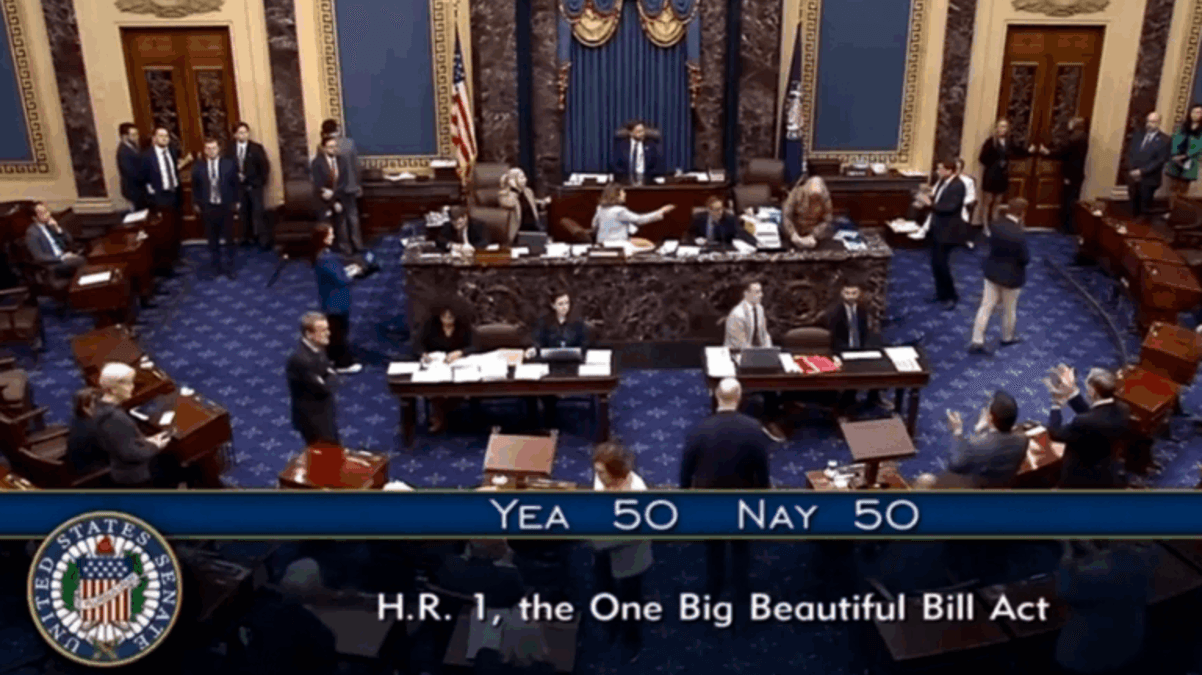Trump’s sweeping tax and spending bill narrowly clears Senate after tie-breaking vote
The US Senate has passed President Donald Trump’s landmark tax and spending legislation after Vice-President JD Vance broke a 50-50 deadlock, delivering a major victory for the administration’s second-term economic agenda.

- The One Big Beautiful Bill Act passed 50-50 in the Senate, with Vance casting the deciding vote.
- The bill makes Trump-era tax cuts permanent but slashes Medicaid and welfare spending.
- The legislation now returns to the House, where its passage remains uncertain amid party divisions.
Republicans in the US Senate have narrowly passed US President Donald Trump’s sweeping tax and spending legislation, marking a significant milestone in Trump’s second-term agenda.
The One Big Beautiful Bill Act cleared the Senate on 1 July, after Vice-President JD Vance cast a tie-breaking vote, ending over 24 hours of heated debate.
The legislation had faced considerable resistance within the chamber. Despite Republican control, divisions over spending cuts and the projected impact on the US deficit left party leaders scrambling for support.
Ultimately, the final tally stood at 50-50, with Vance stepping in to break the deadlock, a moment met with applause from Republican senators and visible frustration from Democrats.
The bill now returns to the House of Representatives, where its passage remains uncertain. House Republicans previously approved an earlier version by a razor-thin margin of just one vote. Republicans can only afford to lose three votes in the lower chamber, highlighting the fragility of support for the legislation.
The bill proposes to make permanent the sweeping tax cuts introduced during Trump’s first term. In exchange, it introduces deep cuts to a range of federal programmes, including Medicaid and food assistance for low-income Americans. Critics argue these measures would severely impact the country’s most vulnerable populations.
Senator Lisa Murkowski of Alaska provided the critical support needed to pass the bill in the Senate after extended negotiations. Murkowski expressed deep reservations even as she voted in favour, describing the process as “rushed” and dictated by an “artificial timeline.”
She told reporters that it was “probably the most difficult and agonising legislative 24-hour period” of her career and urged the House to reconsider certain provisions.
Senate Majority Leader John Thune faced setbacks as three Republican senators — Susan Collins of Maine, Thom Tillis of North Carolina, and Rand Paul of Kentucky — broke ranks to oppose the bill. They joined all Senate Democrats in voting against it, citing concerns about the potential increase in the national deficit and cuts to social programmes.
Trump, speaking during a visit to a migrant detention facility in Florida, hailed the Senate vote as a “great victory,” emphasising that the bill “has something for everyone.” Yet, his optimism may be premature.
According to The New York Times, the House Freedom Caucus has expressed staunch opposition, warning the bill could add US$650 billion to the annual deficit. The group criticised the measure as fiscally irresponsible, contradicting previous Republican commitments to reduce government spending.
Further complicating matters, some House Republicans object to steeper cuts to Medicaid included in the Senate version compared to what they had initially approved. Democrats in both chambers have condemned the proposed reductions to welfare and social safety nets.
Adding to the controversy, tech billionaire Elon Musk, once an influential Trump ally, has publicly denounced the bill.
Musk, who played a significant role in Trump’s 2024 election victory and briefly served as a cost-cutting advisor, threatened to form a new political party if the bill is enacted.

On Monday, he called out lawmakers who support the legislation, stating they should “hang their head in shame,” especially given its impact on clean energy initiatives and electric vehicle subsidies, which could affect Tesla’s business interests.
Procedural delays led by Democrats included forcing the clerks to read the bill’s entire 940 pages aloud and staging a marathon “vote-a-rama” session, during which they proposed numerous amendments to slow the process. However, these efforts ultimately failed to derail the final vote.
With Trump pushing for final passage before 4 July, Republicans in the House face an intense timeline. Trump acknowledged the challenge, saying, “I’d love to do July 4th but I think it’s very hard to do July 4th… maybe somewhere around there.”
The next few days will prove critical as House Republicans deliberate on whether to accept the Senate amendments or send the bill back for further negotiation.
The outcome will determine the future of Trump’s legislative agenda and potentially reshape US social and economic policy for years to come.







